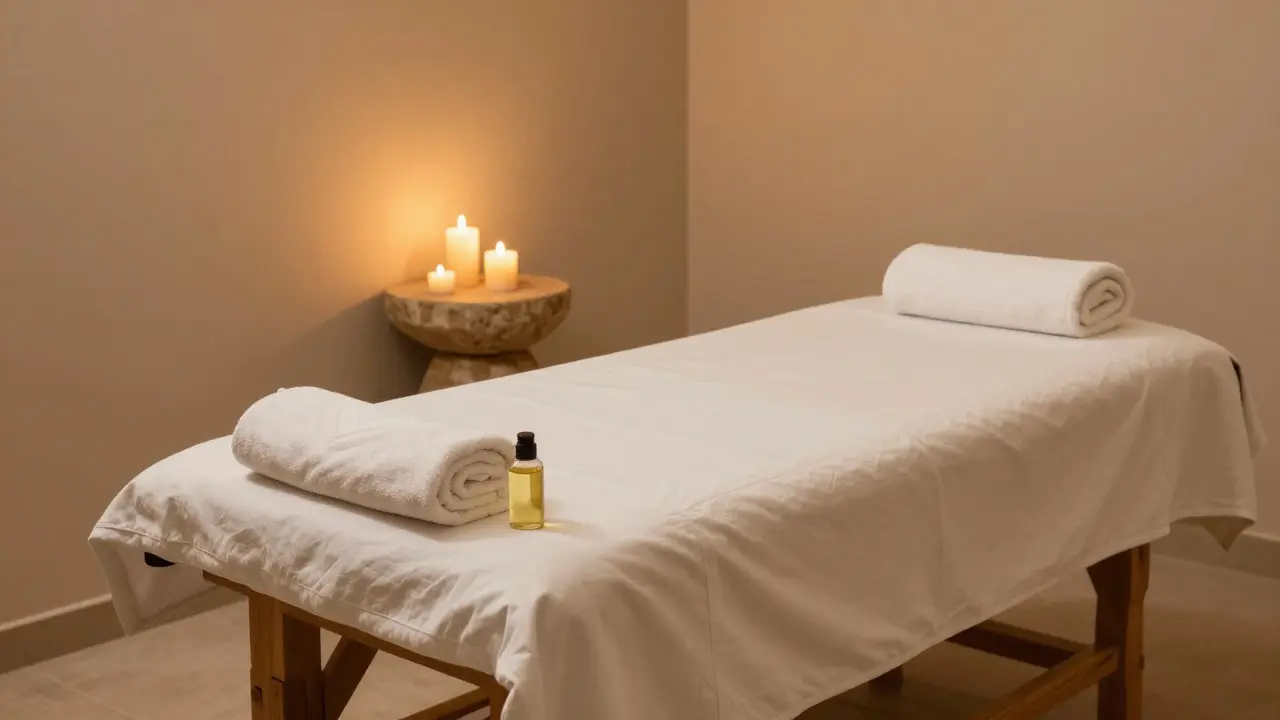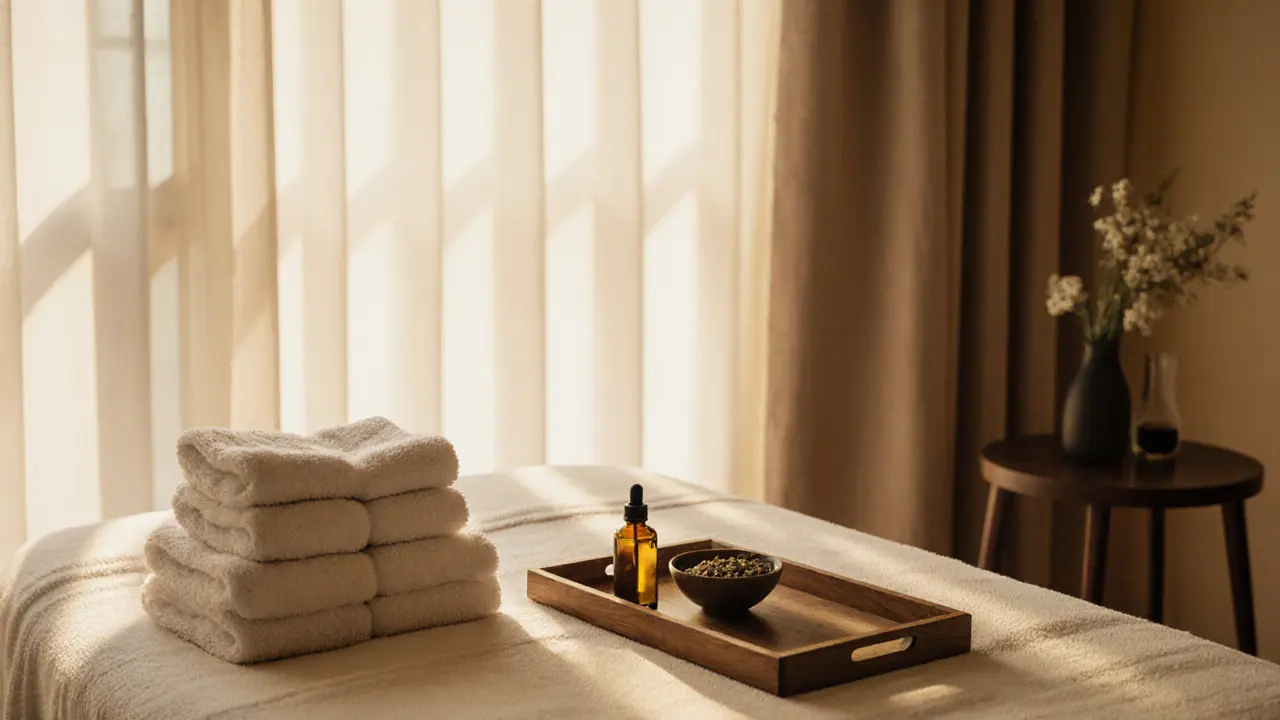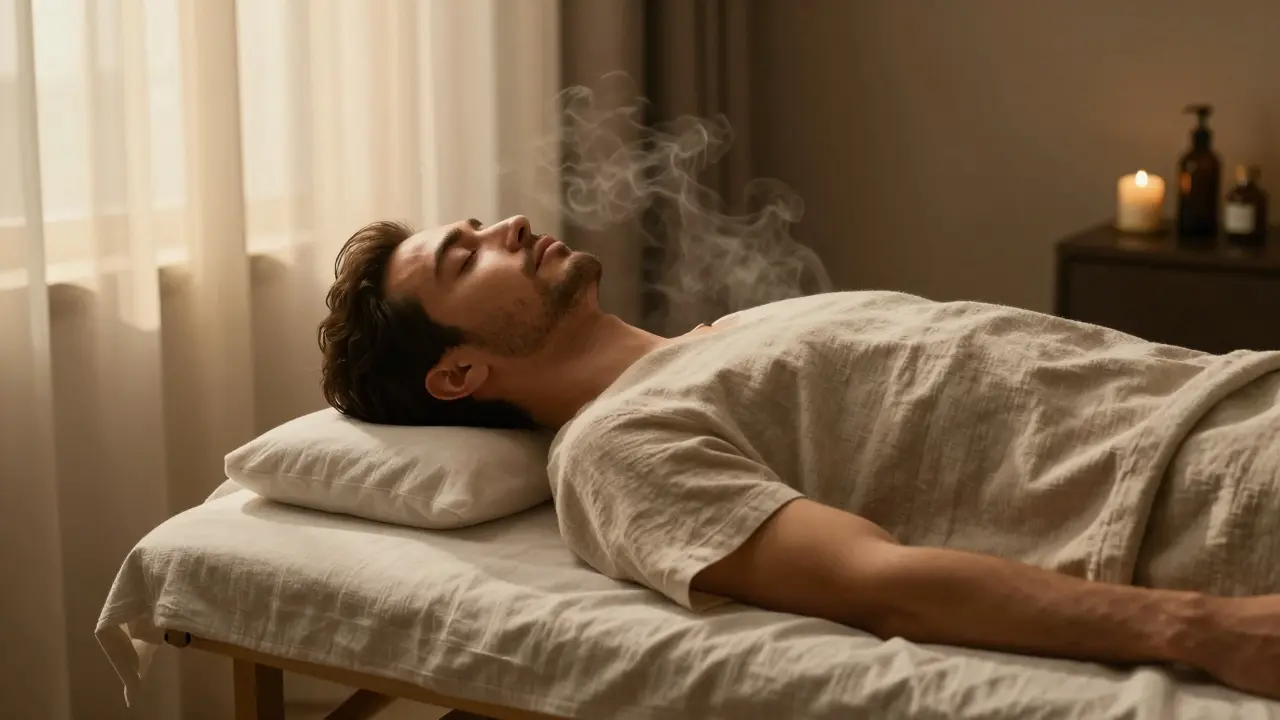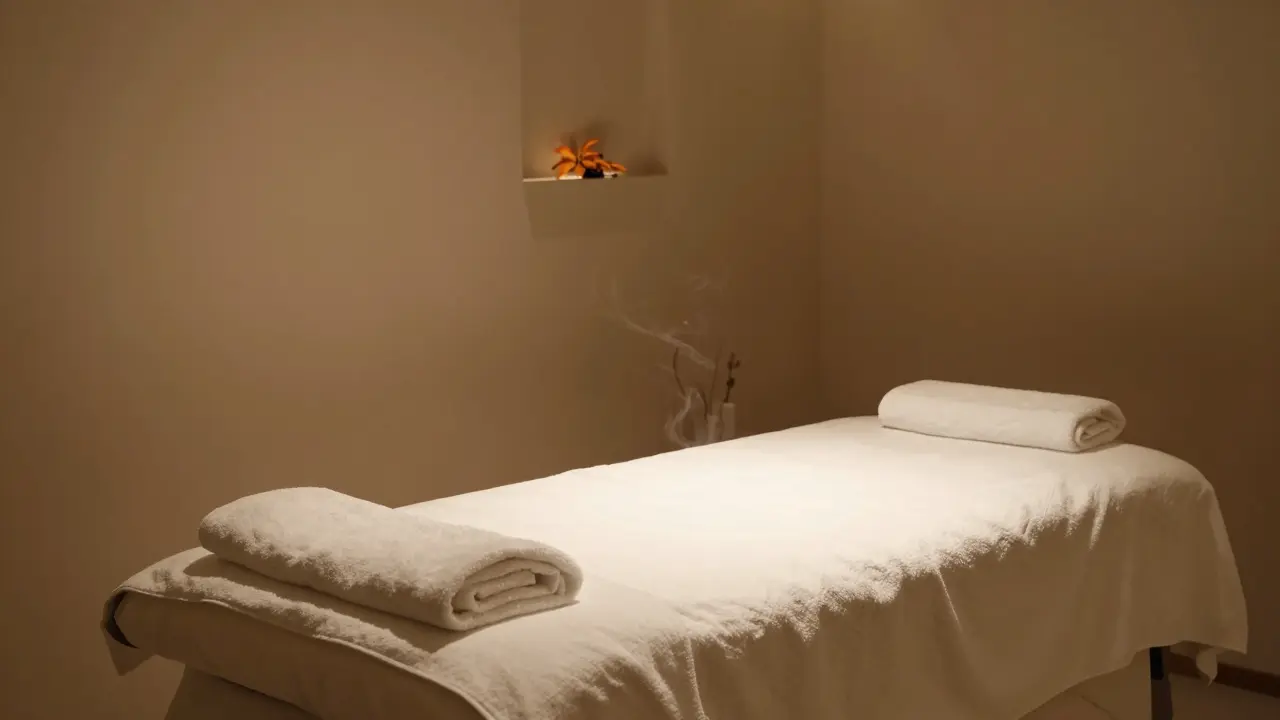Is it Okay to Touch Your Massage Therapist? Your Comprehensive Guide
Weird tension hangs in the air the minute someone quietly asks the big question: is it okay to touch your massage therapist? The answer is simple, yet the ins and outs of etiquette and comfort go way deeper. Whether you’re new to massages or an old hand, nearly everyone’s wondered: “Am I acting weird?” This guide clears up all the awkwardness. Massage therapist boundaries are super important in spas across Dubai and everywhere else, but confusion pops up all the time.
In this article, you’ll learn exactly what’s expected during a professional massage in terms of etiquette—including when (if ever) touching is acceptable, why boundaries are essential, and how cultural factors play in, especially here in the UAE. You’ll see how massage sessions have evolved, what counts as respectful, and how to keep things relaxing for both you and your therapist. Spoiler alert: this isn’t just about rules—it’s also about enjoying your experience and maximizing that post-massage glow.
Understanding the Basics of Massage Therapist Boundaries
Origins and History
Massage has ancient roots, stretching back over 5,000 years to Indian Ayuverdic medicine and traditional Chinese bodywork. Fast forward, and touch remains at the center of human connection and healing. Today, professional massage sits at the intersection of wellness and hospitality, blending therapeutic touch with strict professional standards. These days, especially in Dubai’s spa culture, massage etiquette is shaped by East-meets-West traditions, but what hasn’t changed? The importance of keeping professional and personal lines crystal clear.
Core Principles or Components
Communication, consent, and comfort are the backbone of any modern spa experience. Professional therapists are trained to respect clients’ personal space and will explain what to expect before the session begins, outlining which areas will be treated based on agreed needs. They work with the body, not the other way around, and all touch should be one-way—from therapist to client, not vice versa. If a client needs to adjust themselves, a simple ask (“Can I move my arm?”) is fine—everything’s about keeping clear expectations so nobody ends up uncomfortable.
How It Differs from Related Practices
Massage isn’t a two-way street. Unlike some energy therapies (like Reiki, where touch is minimal or mutual intention matters), classic massage always centers around one party—the therapist—providing expert care. Physical therapy or chiropractic sessions might also involve touch, but in all of them, the professional initiates and controls the physical interaction. Here’s a quick comparison:
| Practice | Key Feature | Primary Benefit |
|---|---|---|
| Massage Therapy | Therapeutic touch from therapist only | Relaxation, pain relief, stress reduction |
| Reiki | Energy work, minimal physical touch | Emotional balance, subtle relaxation |
| Chiropractic | Body adjustments by practitioner | Aligns musculoskeletal system |
Who Can Benefit from Massage Therapist Boundaries?
Boundaries aren’t just for your therapist—they protect you too. If you’re new to spas, clear rules remove awkwardness so you can totally relax. Seasoned spa-goers already know: when trust is established and expectations are set, everyone enjoys the session more. Honestly, this is a key for everyone—beginners, wellness enthusiasts, even professionals under stress. It all comes down to mutual respect, clarity, and the ability to chill out without second-guessing yourself.
Benefits of Boundaries for Body and Mind
Respect Promotes Stress Reduction
Here’s the science-y bit: when you know what’s coming and everyone’s on the same page, your nervous system chills out. Safe environments trigger the body’s relaxation response. The mind is free to wander into total bliss, without getting stuck on “Am I doing this right?” A National Institutes of Health summary stresses how “clear communication about boundaries increases satisfaction and outcomes in wellness settings.” Web source (https://www.nih.gov)
Better Outcomes for Body and Spirit
When you don’t have to worry about misunderstandings, massage delivers its full punch: pain relief, reduced muscle stiffness, and that famous “floating” sensation. Trust allows therapists to use their best techniques without distraction. Think of it as a cozy blanket for your mind—comforting and familiar, letting you enjoy every minute.
Emotional Well-Being and Confidence
Knowing exactly what’s expected can make even the shyest person feel safe and respected. Whether you’re celebrating a big life moment or just burning off work stress, good boundaries mean zero judgment, zero anxiety. This confidence is priceless, especially for anyone trying a spa for the first time or adapting to Dubai’s unique mix of cultures and expectations.
Practical Outcomes in Daily Life
Boundaries in the massage room spill out into the real world. Clear communication and respect are skills you can carry outside the spa—at work, with friends, even when traveling. Here’s a table of key benefits:
| Benefit | Description | Impact |
|---|---|---|
| Stress Reduction | More relaxation, less anxiety | Better sleep, improved mood |
| Physical Relief | Muscle relaxation, pain relief | Enhanced mobility, comfort |
| Emotional Confidence | Feeling respected and safe | Higher self-esteem, relaxation |
| Healthy Habits | Clear boundaries and expectations | Improved relationships, self-care |
What to Expect When Visiting a Spa or Salon
Setting or Context
Picture this: you enter a calming room with gentle lighting, soft music, and the faint smell of essential oils—a world away from busy city streets. In Dubai and most high-end spas, everything’s designed for comfort. A therapist greets you, asks about preferences (pressure, sensitive areas), and walks you through the session plan before anything begins. Privacy is a priority: you’ll undress to your comfort level, slip under a fresh towel, and only areas being worked on are uncovered.
Key Processes or Steps
The therapist checks in about your comfort and health. You lie face down or up, based on the massage style. The therapist uses only safe, professional touch to deliver your treatment. If you flinch, cringe, or get ticklish, let them know—never feel bad for speaking up! If you accidentally brush their hand or arm, don’t sweat it. Purposeful touch from clients isn’t expected, and it’s okay to keep your hands by your sides or resting comfortably. If you need to adjust, just ask.
Customization Options
Spas aren’t cookie-cutter. You can choose calming Swedish, strong deep-tissue, or even aromatherapy blends. Your comfort matters most: some people like silence, others chat to relax. Therapists in Dubai are usually trained to recognize and respect cultural preferences, gender sensitivities, and medical needs, so always let them know yours in advance.
Communication and Preparation
Here’s where magic happens—being open! Always let your therapist know about injuries, ticklish spots, or if you’re uncomfortable at any point. Don’t worry about speaking up: that’s what professionals expect. Your experience will be so much better if you vocalize your needs. Quick tip: before your session, avoid heavy meals, drink a glass of water, and arrive with enough time to fill out any forms or preferences. The more you prepare, the more you’ll enjoy the massage.
How to Navigate Touch and Etiquette Properly
Setting Up for Success
First step: relax! When you book, check reviews and policies of the spa. Upon arrival, communicate clearly—ask about what to expect, and mention anything that makes you nervous. Lay out your comfort zones simply: “I prefer less pressure,” or, “Please skip my lower back.” The more you communicate, the smoother everything goes.
Choosing the Right Tools/Resources
Pick a reputable spa or therapist certified by respected organizations, like the American Massage Therapy Association (AMTA) or a UAE institute with strong training. Check for visible licenses and, if you’re still unsure, just ask. Dubai spas usually display certificates, and you’ll spot hygienic tools, fresh linens, and sanitized rooms which scream professionalism.
Step-by-Step: Respectful Massage Etiquette
- Arrive early to fill forms and discuss needs.
- Ask about boundaries before getting started.
- During the session, keep your limbs relaxed by your sides.
- Need to move? Ask before touching or adjusting—“Is it okay if I stretch my arm?”
- Accidental brushes are normal; don’t worry, move on.
- Never intentionally touch the therapist (hand, arm, etc.).
- If unsure, ask: “What should I do with my arms?”
Tips for Beginners or Couples
If it’s your first time, read up on what to expect and don’t hesitate to ask questions. For couples massages, rules are the same: no touching the therapist, but feel free to chat or hold your partner’s hand (if the spa allows). Remember, everyone in the room also wants a peaceful atmosphere—you, your partner, and your therapist.

Safety and Ethical Considerations
Choosing Qualified Practitioners
Always look for spas with experienced therapists who’ve trained at recognized schools. Don’t be shy—ask to see credentials. A legitimate spa or therapist won’t mind.
Safety Practices
Cleanliness and consent are king. Sheets and towels must be fresh. Tools and rooms should be spotless. Therapists wash their hands before and after every massage. Communication about comfort is a must. Here’s a quick guide:
| Practice | Purpose | Example |
|---|---|---|
| Handwashing | Prevent infection | Therapist cleans hands pre-session |
| Consent Discussion | Protect boundaries | Therapist outlines process and areas |
| Fresh Linens | Hygiene | Clean towels for each client |
| Open Communication | Comfort | Client can speak up anytime |
Setting Boundaries
It can be tough, but you have every right to say “no.” If at any moment you’re not comfortable, let your therapist know. Boundaries go both ways. In Dubai, spas have zero-tolerance for inappropriate behavior, and clients are protected just as much as staff. It’s always better to speak up.
Contraindications or Risks
There are times when it’s better to skip a massage. Active infections, rashes, severe osteoporosis, recent surgeries, or if you’re pregnant (unless you have clearance from your doctor)—all are reasons to play it safe. Professional spas always ask about your health first. When in doubt, consult a medical professional first.
Enhancing Your Experience with Spa Etiquette
Adding Complementary Practices
Want to double up on relaxation? Try light meditation or mindful breathing before, during, or after the massage. Some spa-goers listen to calming music or gently stretch after their session. These add-ons boost your recovery and help maintain that spa feeling.
Collaborative or Solo Engagement
Massages aren’t just solo escapes. Couples, friends, or even parent-child duos book sessions for shared relaxation. The key is to respect the group’s boundaries as much as your own. Solo clients can take the opportunity for quiet, inward focus, while groups may prefer a little more conversation. Everyone can enjoy massages, with or without company, as long as boundaries stay respected.
Using Tools or Props
Therapeutic props like heated stones, neck pillows, or aromatherapy oils (if you’re not sensitive!) can make your session extra enjoyable. You can request these in advance or based on your needs. Never bring your own tools unless cleared in advance with the spa.
Regular Engagement for Benefits
Consistency is key for feeling those long-term benefits. Regular massages can reduce chronic pain, lower stress, and even help with regular sleep. Set a routine that works for you—once a month, two months, whatever fits your schedule. Bonus: you’ll deepen trust with your therapist the more you return.
Finding Resources or Experts
Researching Qualified Practitioners
Look for spas listed on credible wellness platforms, or check for therapist profiles on massage association websites. Word of mouth is gold in Dubai—if your friends have raved about a spa, start there. Always review licenses, credentials, and years of experience. Don’t be afraid to email or call to confirm details.
Online Guides and Communities
There are plenty of ways to get expert info before you even step foot in a spa. Forums and groups focused on wellness, like on Reddit, Facebook, or specialized Telegram channels, all offer first-hand tips and reliable spa recommendations. YouTube and blogs also have walkthroughs if you need a visual nudge.
Legal or Cultural Considerations
When in Dubai, respecting local customs is extra important. Men and women usually have separate areas or specific therapists for cultural sensitivity. Inappropriate touch—accidental or purposeful—is not accepted in spa environments here. Wellness centers are extremely strict about following the law around privacy, consent, and security. Always double-check spa rules first—each can have unique requirements.
Resources for Continued Learning
Simple guides, books like “The Educated Heart: Professional Boundaries for Massage Therapists,” or online courses in professional massage etiquette can deepen your understanding. Look for workshops or introductory classes at your local spa, too—they love teaching newcomers.
FAQ: Common Questions About Massage Therapist Etiquette
Still got questions? Don’t worry, here are answers to the queries people ask most about touching massage therapists and spa etiquette:
What to expect from a session?
Expect a calm, relaxing environment tailored to your preferences, with all boundaries and expectations laid out before the session begins. Your therapist takes the lead, and you’re encouraged to communicate freely about your comfort during the massage. There’s never pressure to interact physically—your role is to relax and enjoy.
What actually happens during a massage?
After a brief chat about your needs and comfort zones, you’ll be left to undress (to your level of comfort) and get on the table. The therapist will only expose and work on one area at a time (using draping for privacy). You remain passive, focusing on breathing and relaxation, while the therapist performs all necessary techniques. If you need to move or adjust, just ask first. Any other touch isn’t just unnecessary—it’s discouraged.
How does massage etiquette differ from other therapies?
Massage therapy is strictly one-way—touch is only delivered by the licensed therapist. Unlike yoga or partner stretching, clients don’t physically interact except for repositioning as needed. Other wellness treatments, like energy medicine, might involve no touch at all or shared intention, but massage always keeps roles defined for comfort and safety.
What is the method behind professional boundaries?
The core method is really about consent and safety—setting clear ground rules, respecting privacy, and focusing on the recipient’s well-being. Professionals are trained to recognize discomfort, communicate openly, and maintain ethical standards at all times. Their job is not just to heal the body, but to build trust.
Are these etiquette rules suitable for beginners?
Definitely! Spas and therapists are very used to first-timers. If you’re new, don’t be shy—ask any question upfront, mention your comfort zones, and let your therapist know if you’re unsure about anything. Professionals make it easy to relax, and your role is simply to enjoy the experience without worrying about the right or wrong way to “be” on the table.
Why Massage Therapist Boundaries Are Essential for Every Spa Experience
A Path to Peace and Confidence
Massage etiquette isn’t just about following the rules—it’s about protecting your peace, building trust, and making every session better. Keeping boundaries clear is what lets clients and therapists alike find true relaxation and healing.
Try It Mindfully
If you’ve been hesitating, give massage a try with these etiquette tips in mind. Seek professional guidance, communicate openly, and see how boundaries become the gateway to comfort and joy.
Share Your Journey
Tried a new spa or massage style? Share your tips and experiences with our wellness community in the comments below. Your story might help someone else step confidently into their own relaxation journey! Curious for more advice on Dubai wellness? Follow my blog for ongoing tips and local spa secrets.
“Clear boundaries in the massage room foster trust, mutual respect, and the most effective relaxation for everyone involved.” — International Spa Association
Some links may be affiliate links, but all recommendations are based on research and quality.







Michelle Zhong
August 1, 2025 AT 17:23Touching a massage therapist is a topic that dances on the fine line between cultural etiquette and personal boundaries. It’s fascinating how in some cultures, a simple handshake or a friendly pat on the back might be perfectly normal, while in others, it could be seen as intrusive or inappropriate. The essence really lies in understanding and respect. The therapist is there to provide a professional service, not to reciprocate physical gestures unless explicitly welcomed.
Imagine the spa as a sacred space where healing and respect coexist. Any form of unsolicited touch could potentially disrupt the therapeutic atmosphere and trust built during the session. I encourage everyone to always ask or wait for clear social cues or direct consent before initiating any physical contact. After all, respect and communication are the pillars that hold the sanctity of wellness practices together.
In places like Dubai, where cultural norms are quite conservative, it becomes even more critical to honor these invisible yet palpable lines drawn by societal expectations. Taking a moment to consider this can enhance the experience not just for the individual but for everyone involved.
rafael marcus
August 2, 2025 AT 21:10I absolutely agree with the importance of boundaries here, but I'd like to add that sometimes the client might feel a bit awkward about not being able to express gratitude in a more physical way, like a handshake or a light touch to say thanks. I think what's essential is that both parties feel comfortable and respected. Therapists often appreciate verbal thank-yous as much as anything.
Also, it's important for clients to realize that part of why therapists keep those boundaries strict is to maintain professionalism and to avoid any misunderstandings that could lead to discomfort or worse. That said, if a client ever feels unsure, simply asking "Is it okay if I touch your shoulder to thank you?" can clear things up instantly.
At the end of the day, the spa experience should be one of relaxation and mutual understanding. Let's keep that spirit alive!
Kim Kemper
August 4, 2025 AT 00:57Oh, this is such an important topic! 😊 The way physical boundaries are respected in massage therapy really sets the tone for how safe and relaxed everyone feels. It's always best to err on the side of caution and respect those invisible walls therapists keep in place for their own comfort and ours. 💆♀️
I've personally experienced spas where they encouraged a respectful handshake at the end, and others where any touching beyond the massage itself wasn't allowed, and both felt perfectly fine. Communication and cultural sensitivity are key. 🙌
Also, therapists are people too, with their own comfort levels, and if you sense hesitation, it's perfectly okay to keep things professional and say a warm thank you instead! 🌟
Yzak victor
August 5, 2025 AT 04:43From a grammatical and clarity standpoint, the key takeaway here is that the etiquette surrounding touch in massage therapy is highly variable and context-dependent, so clients should always err on the side of explicit consent. Statements like "Is it okay to..." or "Would you mind if..." can be invaluable tools to avoid uncomfortable situations.
Moreover, the boundary guidelines are often written into the policies of spas and wellness centers - these should be consulted beforehand. Accountability and professionalism hinge upon such transparent communication. The ambiguity that sometimes exists can be settled by simple verbal clarification right before or after the session.
In conclusion, assuming nothing and always asking first is the best route to peaceful and respectful interactions.
Kiara F
August 6, 2025 AT 08:30Honestly, if you're touching your massage therapist without explicit permission, you're just crossing a line. The whole point of a professional massage is to have clearly set boundaries. Anything else is not just inappropriate, it's downright rude.
We need to stop confusing friendliness with physical contact. There are many ways to say 'thank you' or show appreciation without putting someone in an uncomfortable position. If you can’t keep your hands to yourself in a professional setting, then maybe you need to reflect on why you're going there in the first place.
Respect is not optional; it’s mandatory. I don’t care what culture you come from or how relaxed your intentions are. Boundaries exist for a reason, and when you ignore them, you’re being selfish.
Nicole Ilano
August 7, 2025 AT 12:17While I understand the necessity of boundaries in massage therapy, the mechanisms of boundary definition in spa settings sometimes become a grey area due to varying organizational matrices and therapist-client relational dynamics. The corporeal interactions in these therapeutic milieus are deeply nuanced.
Practically speaking, the corporeal engagement is delineated by the professional therapeutic scope and cross-referenced with ethical considerations stipulated by regional wellness regulatory bodies, not merely by unilateral verbal consent. Hence, unsolicited contact from clients could complicate the therapist’s fiduciary responsibility and might generate cognitive dissonance regarding professional boundaries.
Therefore, I advocate a conscious awareness of the intricate kinesiology involved and that clients respect the therapeutic protocols without presumptuous corporeal rejoinders.
Abagail Lofgren
August 8, 2025 AT 16:03Thank you all for these insightful comments! It really highlights how complex and sensitive the issue of physical boundaries in massage therapy is. I wanted to add that in my experience training in spa management here in Dubai, we emphasize cultural competence because it's such a melting pot of traditions and expectations.
We train therapists to gently set and communicate their boundaries clearly, and we encourage clients to respect these guidelines. For example, some therapists welcome a handshake at the end, but others do not. We always tell clients to look for verbal or non-verbal cues and to never assume touch is okay without explicit consent.
Ultimately, the goal is a healing environment where everyone feels comfortable, safe, and respected. Thanks again for sharing your perspectives!
Susan Baker
August 9, 2025 AT 19:50For me, the conversation about touching your massage therapist touches on deeper sociological and psychological grounds. Boundaries in therapeutic touch are not just about physical space but are strongly tied to the power dynamics between client and practitioner. There's a complex interplay of consent, trust, and professional ethics.
Additionally, the somatic experience for the therapist, who must manage their own comfort zones while performing intimate physical work, means that unsolicited or unexpected touch can disrupt their focus and the therapeutic process. The professional codes of conduct often provide a framework, but societies and individual preferences vary greatly.
I appreciate this post for opening up discussion about a sensitive but crucial aspect of wellness culture.
diana c
August 10, 2025 AT 23:37Just jumping in here to emphasize something that might be overlooked in all this: communication is king. You don’t have to guess or feel anxious about it. A simple, honest question to your therapist before or after the session clears up any ambiguity. It shows respect and mindfulness, which is exactly the vibe spas thrive on.
Also, keep in mind that there are professional boundaries that therapists have to honor themselves, sometimes more strictly than clients expect. So the best way to contribute positively to the experience is by respecting those boundaries and fostering open dialogue.
Respect, clarity, and empathy create a truly nourishing space for everyone involved.
Nelly Naguib
August 12, 2025 AT 03:23I've got to say, sometimes people get way too casual about this stuff, and it's really disappointing. This isn't just about feeling 'awkward' or 'not knowing what to do.' It's about professionalism and basic human decency. Touching your massage therapist when it's not part of the treatment plan is a boundary breach, plain and simple.
People need to remember that therapists are not friends or romantic interests. They are professionals providing a service. If you start blurring those lines, you risk making the experience uncomfortable or even unsafe for everyone.
We need to stop downplaying this and start respecting therapists the way they deserve.